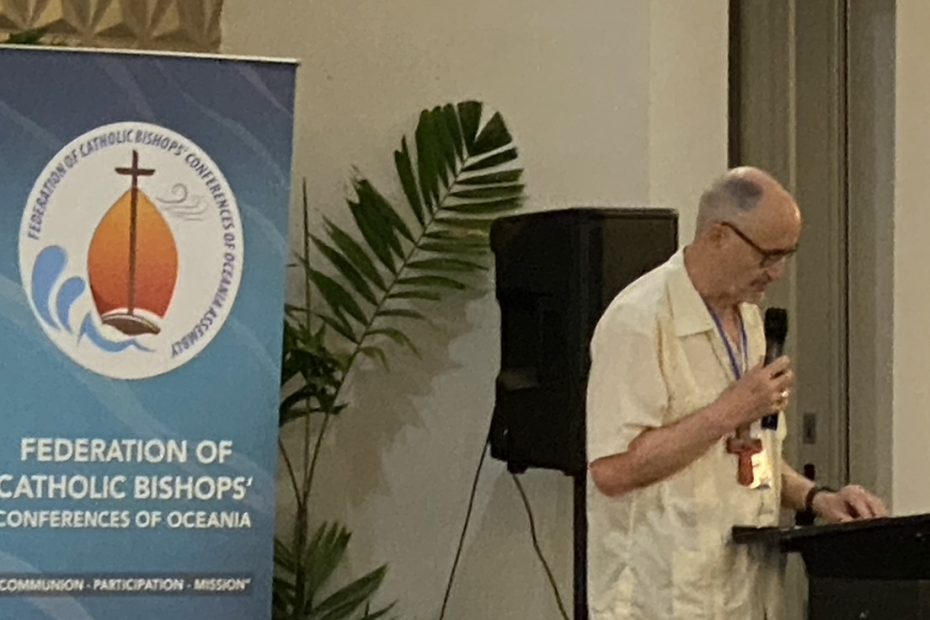RAOEN shares the opening address of Cardinal Michael Czerny, Prefect of the Dicastery for Promoting Integral Human Development, during the Federation of Catholic Bishops Conferences’ of Oceania (FCBCO) Assembly in Suva, Fiji. The gathering aims to promote the well-being of the family of nations by drawing on the cultural riches of the peoples of Oceania, deepen the collegial spirit and to strengthen solidarity (synodality) among the members of the four-member Conferences, and contribute more effectively to the common good of the Universal Church. Cardinal Czerny discussed three main points: climate change and care for the oceans, synodality, and a shared dream towards a more synodal way of being a Church.
Dear brothers and sisters in Christ, dear brother Bishops and priests, dear and honoured guests, participants and organizers,
Thank you for inviting me to open the General Assembly of the Federation of Catholic Bishops Conference of Oceania, hosted here in beautiful Suva, Fiji. As a guest, I struggle to learn, and some facts and topics may strike me forcefully, that you no longer notice because they have become so familiar to you. On arrival, two topics are top of mind: climate change and synodality.
Climate Change
Climate change falls under care for our common home, which here also means care for the ocean. This highly topical theme is deeply connected with integral human development, which embraces people-centred development as understood by the Pacific Islands Forum and other NGOs in this region. For centuries, the island peoples of Oceania have depended on the ocean and its resources for sustenance and livelihood. Divine Providence has been manifest in the bountiful generosity of the land and water, trees and wildlife, as your stories, songs and dances acclaim.
Our best scientists tell us that the ocean is the cradle of life, echoing the Book of Genesis when God said, “Let the water teem with an abundance of living creatures” (Gn 1:20). Ocean currents flow around the world, highlighting the interdependence of communities and countries. Creation has a dignity well beyond whatever goods or services it can provide to humankind. We are called to respect creation and its inherent laws (LS 69), not just grab what’s useful. We must learn the ‘wisdom of the ocean’.
But the tides are also rife with tension, such as the unsustainable and inequitable exploitation of species and resources, deep-sea mining, trafficking of human beings and piracy, the desperate migration of displaced people, and geo-political rivalries. Rising sea levels1 — combined with coastal erosion and freshwater salinization and unabated marine pollution — are disrupting livelihoods. Climate refugees are forced to flee.2 Such tensions are effects of the ocean warming and the climate deteriorating.
Laudato si’ puts it all together: “We are faced not with two separate crises, one environmental and the other social, but rather with one complex crisis which is both social and environmental” (LS, 139).
This is a matter for everyone’s involvement. We need to hear from academicians, scientists and environmentalists about our behaviours that contribute to marine pollution, river siltation and deforestation. We also need to listen to local and international environmental organizations regarding behaviours that we need to alter, attitudes to revise, state laws to enact and communal practices to implement. And we need to hear from the people themselves who are living these fraught realities. Are their pastoral workers and pastoral theologians walking with them and helping them to make their voices heard?
In response, the Church makes her powerful proposal, as in the title of the Dicastery I’m responsible for: integral human development. We go back to Jesus who said, “I have come that they may have life, and have it abundantly” (John 10:10).
The conciliar and post-conciliar magisterium interprets ‘human development’ in the direction of a ‘sincere gift of self’ (GS 24). In this perspective, Pope Francis writes in Fratelli tutti: “A human being is made in such a way that he is not realised, does not develop and cannot find his fullness except through a sincere gift of self… Life subsists where there is bonding, communion, brotherhood; and it is a life stronger than death when it is built on true relationships and bonds of fidelity’ (FT 87).
St Paul VI, just over fifty years ago, rendered in a more contemporary form the words uttered by Jesus in Jn 10:10. In Populorum Progressio, he understood ‘life in abundance’ as expressing Christ’s will to lead us towards ‘integral human development’ (Populorum Progressio, 14-17).
In this way, Pope St Paul urged the Church to pay attention to all circumstances in which human life is threatened, coerced, limited in its development according to God’s plan. He also directed the conscience of Christians to recognise as contrary to God’s will all those realities of evil (e.g. poverty, injustice, exploitation, violence) that limit human beings in the exercise of their fundamental rights, their inalienable dignity, their calling to develop.
Faced with the task of promoting integral human development, what is the role of the Church, of the Bishops? Both to denounce and to announce are important tasks for pastors. It is also necessary for Christ’s follower to act and intervene in history, enriching the present with good. In this sense, the task of the local Churches is to accompany the joys and hopes, the sorrows and anxieties of the people in a pastoral, practical, profound and constant way.’
And how to accompany without knowing? So, how to know situations closely? The way is an approach in which listening, dialogue and reflection in a synodal manner becomes a constant point of departure, and then discerning, proposing and supporting effective responses to help promote integral human development for all. But people have opposing interests. Think of the poor who suffer the worst consequences of pollution, and the companies that pollute but employ the population. A pastor is pastor to all. How should he shepherd? How to navigate such treacherous waters? Only a synodal process can help us discern and walk together.
Synodality
Having looked at challenges facing the Church and our effort to respond, in all honesty we ask ourselves, “In order to accompany and respond, how can the Church renew herself?” It is by learning to walk together, called “synodality”, which is renewing the Church for her mission in the Third Millennium. Fortunately you will be hearing more from Sister Nathalie Becquart about the synodal journey.
Last week you received a powerful letter from Cardinals Grech and Hollerich. They reflect on the process to date and encourage our vigorous involvement in the coming phase.
The Synod on Synodality invites us “to listen, as an entire People of God, to what the Holy Spirit is saying to the Church. We do so by listening together to the Word of God in Scripture and the living Tradition of the Church, and then by listening to one another, and especially to those at the margins, discerning the signs of the times.”3
Because God speaks through his people, we need to listen to our brothers and sisters from Papua New Guinea, Fiji, Tonga, Tuvali, Kiribati, Torres Strait, among others, as they share their stories and struggles, longings and challenges. We need to learn from our indigenous brothers and sisters, the Maori, Aboriginal Australians, Papuans, and Austronesians, how they have cared for creation through the ages. Perhaps their awe over the mysterious grandeur of creation and gratitude for the fecundity of the earth have allowed them to partake of the fruits of the earth without despoiling oceans and rivers, mountains and forests.
The Cardinals’ letter says clearly and simply: “We are called to chart a common course beginning with the contribution of all.” This is what the Synod is supposed to do, and what the Federation of Catholic Bishops Conference of Oceania is supposed to do, and what this General Assembly is supposed to do.
We then need to bring all that we have heard, from various stakeholders of our common heritage, to pray and discern where the Spirit is leading us as a local and regional Church. However, before we discern the Spirit’s promptings, we need to humbly admit our personal and collective complicity in the degradation of our environment, and the dire consequences of such on poor and marginalized communities.
Real conversion is needed so that we might be readier to fulfill our vocation and mission: “Every renewal of the Church is essentially grounded in increase of fidelity to her own calling. So in carrying out her mission, the Church is called to constant conversion, which is a ‘pastoral and missionary conversion’, too; this involves renewing mentalities, attitudes, practices and structures, in order to be ever more faithful to her vocation.”4
Let us “walk together”, then, in the certainty that “It is precisely this path of synodality which God expects of the Church of the third millennium.”5 Let us catch “a glimpse of the face of a Church that is learning to listen to the Spirit through listening to one another.”
Our shared dream
In this voyage of discovery and transformation, you are not out on the ocean alone. Pope Francis, the Roman Curia, the Synod Secretariat, the Dicastery for Promoting Integral Human Development are with you. Our service “consists, in the first place, in recognising and supporting the work that [the Bishops] do for the Gospel and the Church, in timely advice, in encouraging the pastoral conversion that they promote, in solidarity support for their evangelising initiative and their preferential pastoral option for the poor, for the protection of minors and the vulnerable, and for every contribution in favour of the human family, unity and peace; in short, to their initiatives so that peoples may have abundant life in Christ’ (Praedicate Evangelium, II, 3).
One way of evaluating the success of this General Assembly will be to ask how, together, we have learned to appreciate more deeply the overall theme, “For a Synodal Church: communion, participation, mission,” as applied to the Church in Oceania. Concretely, given the immensity of the territory encompassed by your Federation: how can you possibly maintain contact with each other, let alone carry out joint activities? But perhaps some new organizational forms, plus advantages of the internet, offer some promising possibilities. I wonder if you see the synodal process, now more than a year old and continuing on, as an opportunity to test methods and structures of collaboration that could be made permanent.
As we gather this week to listen to and learn from one another and discern where the Spirit is leading our communities, we pray for the audacity to dream great dreams for all humanity, for the created world, and for our Church. The purpose of the Synod, we recall, is “to plant dreams, draw forth prophecies and visions, allow hope to flourish, inspire trust, bind up wounds, weave together relationships, awaken a dawn of hope, learn from one another and create a bright resourcefulness that will enlighten minds, warm hearts, give strength to our hands”6 and save our common ocean home.
Let us paddle and sail together with our Lord Christ Jesus.


